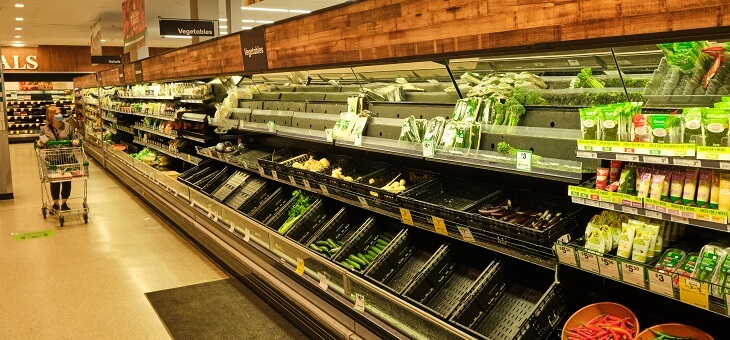We’ve become familiar with empty shelves at the supermarket over the past few years – first due to panic buying and then because of staff shortages and supply problems.
Obviously, toilet paper is an essential in most households – unless you’ve joined the re-useable toilet wipes ‘revolution’ – and easy to stock up on. But you can’t really stock up the latest item in short supply – eggs.
Australian egg producers say the move towards free-range egg production is partly to blame for current shortages.
Bede Burke, Egg Farmers of Australia chairman, told The Australian that free-range farming practices mean chickens are more exposed to the cold winter weather, which naturally reduces their egg output.
Free-range chickens are also more likely to suffer from disease and be taken by predators. In contrast, caged hens are protected from the elements and generally live longer.
Read: Supermarket checkout pain mast last for years, suppliers warn
“Caged birds will produce more eggs and fewer birds die,” Mr Burke says.
“They also have a longer laying cycle that you just can’t get out of free-range [hens].”
Mr Burke says another reason for the shortage is that many suppliers let their flocks of egg-laying hens dwindle during the pandemic, as restaurant and café closures meant egg demand drastically dropped.
Currently, Coles is implementing a limit of two trays of eggs per customer, although Woolworths and Aldi have no limit yet.
Eggs join a long list of grocery items either disappearing from supermarket shelves completely or rising astronomically in price in recent weeks.
Read: Grow your own veg to beat the cost of living
Woolworths told Channel 7 it’s facing shortages of canned chickpeas and lentils at its stores and is in talks with suppliers to increase availability. A chickpea shortage is particularly grinding for Australians, as we are the world’s second-largest producers of chickpeas.
“We’re working with suppliers to maintain regular and consistent deliveries of stock to supermarkets,” a Woolworths spokesperson said.
“Customers should notice increased availability of stock over the coming week.”
Also affected recently have been supplies of zucchini, green beans, tomatoes, lettuce, spinach, spring onions, broccoli and berries.
Read: Switching supermarkets could save you $2500 a year
A combination of lingering pandemic staffing and supply chain issues, widespread flooding and extreme cold around Australia, as well as increased fuel prices have come together to create a ‘perfect storm’ of extenuating circumstances.
The situation has highlighted Australia’s ‘food security’ – or lack thereof.
Dr Rachel Carey, senior lecturer in food systems at the University of Melbourne, told the Sydney Morning Herald that Australia’s position as a net exporter of food should not be taken for granted. She says the government needs to do more to secure food supplies for the domestic market.
“The COVID-19 pandemic was perhaps the first time that Australian consumers had that experience of going to a supermarket and not finding what it was they wanted to buy,” she said.
“We’ll continue to experience that more frequently, unless we really do some serious long-term planning to increase the resilience of the food supply.
“We don’t really have anybody in government who is accountable for whether people have enough food, so a minister for food might be a good start.”
Have you had any trouble getting the fresh produce you usually buy? How could a ‘minister for food’ actually help keep produce in Australia? Let us know in the comments section below.
If you enjoy our content, don’t keep it to yourself. Share our free eNews with your friends and encourage them to sign up.

